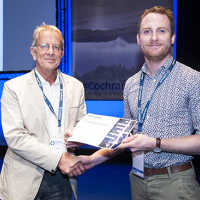
Cochrane Australia Research Fellow and Co-Convenor of the Cochrane Bias Methods Group Matthew Page recently took out this year’s Bill Silverman Prize, which recognises and celebrates the role of constructive criticism of Cochrane and its work. Here we catch up with Matthew about who and what inspired him to research and publish his prize-winning paper on common statistical flaws in systematic reviews.
Just under a decade ago, Matthew Page was a newcomer to Cochrane. Attending his first Colloquium in Singapore in 2009, he watched Dr David Moher take out the Bill Silverman Prize and as a result, first discovered methodological research. ‘You could say that was kind of a lightbulb moment that led to all my future research interests,’ Matthew says. ‘I listened to David at the Colloquium and immediately went home, read his paper and realised there’s a whole community out there, a whole field that’s actually all about trying to improve research. Since then, David has become my mentor/methodological hero and we’ve been working together on all kinds of fascinating areas. So it seems really fitting to receive this award for a paper I worked on with both David and the late Doug Altman – another extremely inspiring and brilliant statistician who’s influenced my thinking about methods and meta-analysis.’
‘This particular paper was actually Doug’s brainchild. He - like Bill Silverman himself - often bemoaned the poor quality of published medical research. He strongly believed self-criticism can help drive progress, which is what this award is all about,’ Matthew explains. ‘Following a paper we published on reporting quality of systematic reviews in PLOS Medicine in 2016, Doug guided us to conduct this comprehensive analysis of the misuse of statistics in systematic reviews. We looked at a range of different statistical methods which could be used in systematic reviews and assessed whether they were applied and interpreted correctly in 32 Cochrane and 78 non-Cochrane reviews. Using a 61-item checklist, we discovered that there were common flaws in many Cochrane and non-Cochrane reviews. Our findings suggest many areas where Cochrane review authors can lift their game.’
‘By identifying these flaws, we can gain a much better idea of which statistical methods need checking in submitted Cochrane reviews. We’re hoping to address the issues we identify by developing a checklist that can be used by editors to evaluate the statistics in submitted Cochrane reviews. Once errors are spotted, these can be fed back to the review authors and corrected, which we hope will ultimately lead to higher quality reviews. You could say that these findings probably confirm suspicions that the involvement of statisticians on review teams can really help to address a lot of methodological shortcomings.’
‘So for me personally it was great to be able to identify and address areas for improvement in the future and ultimately receive the honour of this award for doing so,’ Matthew concludes. ‘I think the prize is also further recognition of Doug Altman’s phenomenal contribution to Cochrane and evidence-based medicine. And it also gave us yet another reason to celebrate David Moher, whose work was recognised in a half day symposium at the Colloquium this year. We are both looking forward to doing further work in this area to help authors and editors wrangling with all sorts of methodological questions and approaches.’
For more on Matthew’s work into systematic review methods, read his interview with Cochrane Senior Editor Toby Lasserson on Assessing the current state of systematic reviews, his Epidemiology and Reporting Characteristics of Systematic Reviews of Biomedical Research: A Cross-Sectional Study in PLOS Medicine or follow him on twitter @mjpages.
Image: Prof David Henry (left) presents Matthew with this year's Bill Silverman Prize at the Cochrane Colloquium in Edinburgh
